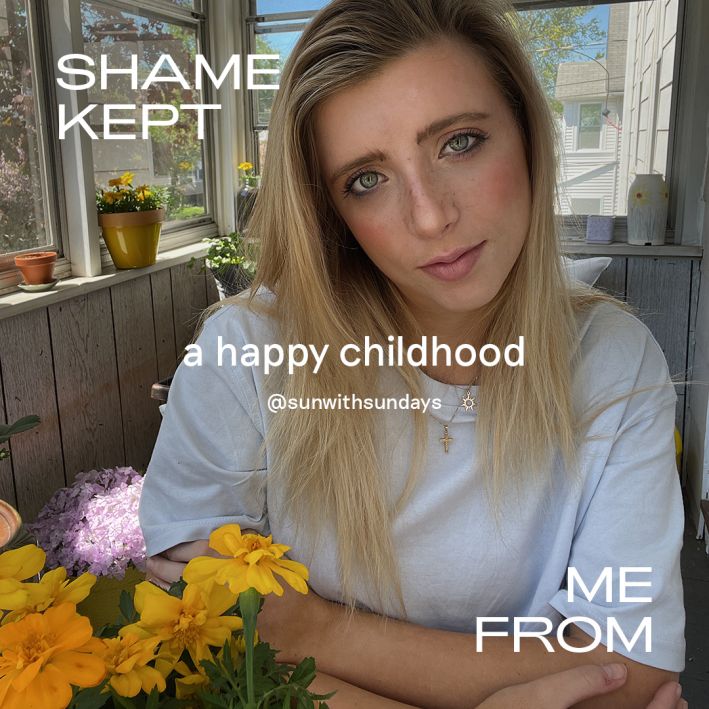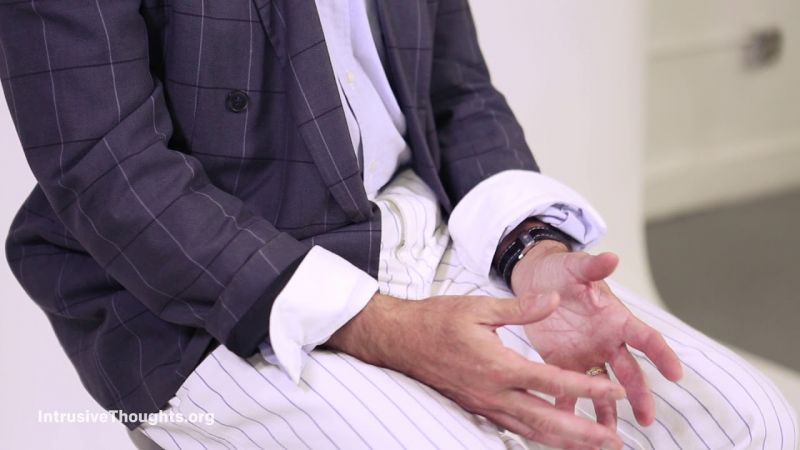Shame Kept Me From a Happy Childhood
My harm intrusive thoughts invaded pivotal life moments.
Written by Sarah McKinnon

01 Sarah has lived with Harm OCD since childhood, but wasn't diagnosed until the age of 21.
02 She shared her diagnosis story for our May Shame Shouldn't Be a Symptom campaign.
If I gave fully into my shame, and didn’t seek help, I wouldn’t be sitting here today.
My name is Sarah and I have Harm Obsessive Compulsive Disorder and am a Suicide Survivor.
I’ve had intrusive thoughts, severe anxiety, compulsions and panic attacks from a very young age. However, I wasn’t diagnosed until I was twenty-one years old. Despite the amazing efforts of my parents, doctors would only give me a few minutes of their time. I remember they had me always circle a smiley-face zeroxed sheet of paper to rank my “stress.” When I saw I only had three faces to choose from (and nowhere did harmful thoughts seem normal) I was scared.
I became convinced that if I spoke what I thought; I’d be taken and never seen again, so to speak. I didn’t feel safe to speak up. I soon began to believe I was a horrible person and wasn’t worthy of being alive. Even in the American public educational system nowhere did “intrusive thoughts" get spoken in conversation during health classes, especially the “taboo” and involuntary one’s. I would fall into a panic attack and continually miss class, or be afraid to have any friends as a child.

OCD3: What is Harm OCD?
Dr. Phillipson defines and discusses Harm OCD
I often didn’t get the right treatments and medications because of this, and I was told it was, “just a phase”, only my “female hormones,” or the classic “mood adjustments of being an adolescent.” I do believe these are factors, but mental health has become seen as an umbrella term of which everyone fits under and thus so requires the same type of care. But we are a unique person that deserves an education for our minds, not just a boxed system that has life long consequences on our livelihood.
The terror I faced every night was intoxicating and tortuous. The intrusive thoughts felt like oil on my body, unable to remove despite constant scrubbing (of which I’d later learn is the normal rumination process). I therefore was not in the present during pivotal life moments, and happy picturesque family vacations or memories. I instead was clawing at my skin or pacing for hours at a time. I would go without eating for days, or be in such a panic that I would lock myself in the bathroom for two days and only drink tap water.
Eventually I would be screaming for relief, drooling on myself crying, and feeling like I had no freedom and I would never know happinesses or love. I became ashamed of my mental health and I felt like a burden. I channeled my mental health anxiety into a workaholic attitude, convinced that my success was the only counter-weight to my intrusive mind.
A few days after a suicide attempt, as I was convinced life as too painful to bare, God provided me with two amazing words in a frantic early morning internet search: intrusive thoughts. Twenty-one years of life, and I had never heard those words before.
The post came from Made of Millions and was written by another girl who had my same intrusive thought pattern. It gave me the words I needed to not just ask for help but for the right kind. Mental health awareness is beyond just the knowing of a condition in the public eye, but the resources and education to be instilled in our existing systems to bring the right kind of path to people earlier to offset the chances of a worsening condition.
I now tell every person I meet about intrusive thoughts. I believe the psychological understanding of rumination is not just for the OCD suffer but for everyone as we all walk through the highs and lows of life. We all are faced with the inner dialogue of ourselves and an understanding of the cycle of these mental experiences can improve your day to day understanding of the separation of thought. If I could find that girl who surpassed her shame to tell her story, I would give her a hug and tell her she saved my life. Your story matters.
Support our work
We’re on a mission to change how the world perceives mental health.



















